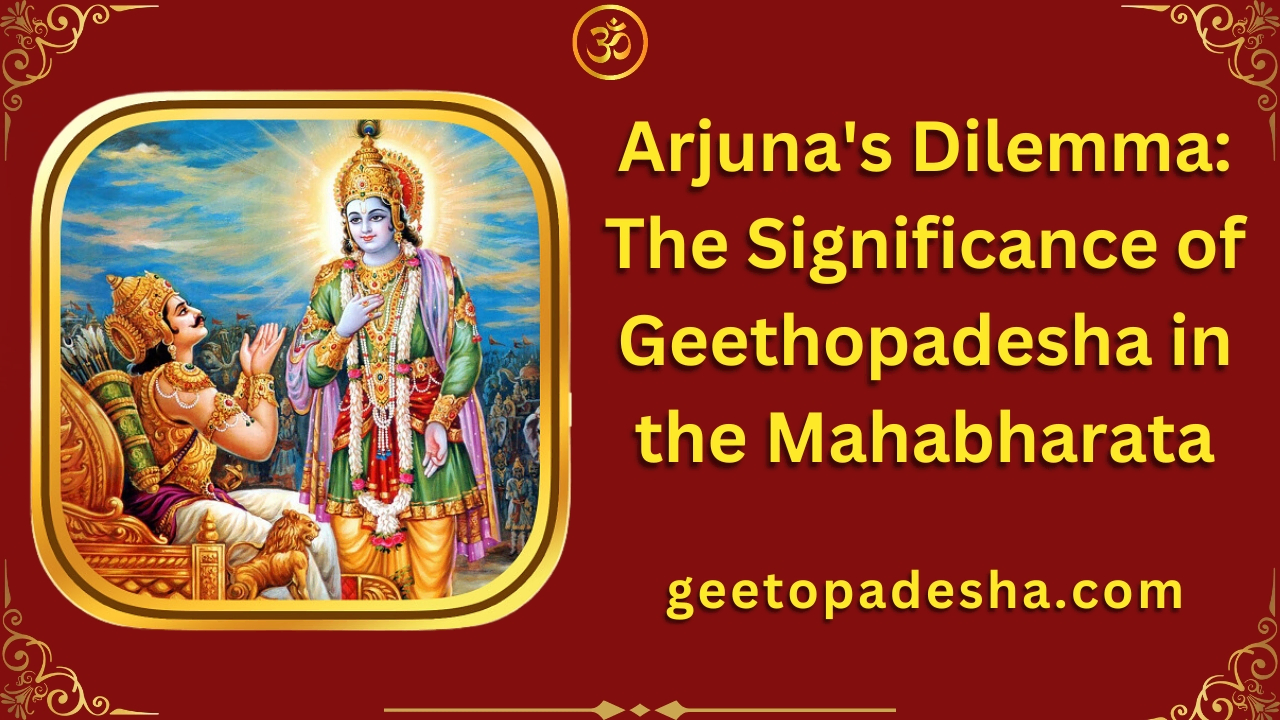The Mahabharata, one of the two great Indian epics, is an immense narrative that encompasses various themes, characters, and subplots. Among its many stories, Arjuna’s Dilemma and the subsequent Geethopadesha or Bhagavad Gita have held a special significance for centuries. These episodes not only emphasize the human struggle with moral and ethical dilemmas but also offer profound wisdom for self-discovery and spiritual growth.
In this comprehensive article, we explore Arjuna’s Dilemma, delve into the Geethopadesha, and uncover the significance of this divine discourse within the larger narrative of the Mahabharata.
Arjuna’s Dilemma: A Conflict of Duty
At the heart of Arjuna’s Dilemma lies a deep conflict between duty and emotion. As one of the Pandava brothers, Arjuna finds himself on the battlefield of Kurukshetra, facing his own kin and gurus, including the Kaurava cousins, Bhishma, and Drona. Despite being an unrivaled warrior, he becomes distraught and confused, questioning the righteousness of the war and his role in it.
Arjuna’s Dilemma embodies the timeless struggle between following one’s dharma (duty) and the emotional turmoil that accompanies such choices. His predicament reflects the human tendency to seek meaning, purpose, and higher understanding when confronted with moral dilemmas.
Geethopadesha: The Divine Discourse
As Arjuna’s charioteer and trusted companion, the god Krishna witnesses his friend’s inner turmoil and decides to guide him. This guidance comes in the form of the Geethopadesha or Bhagavad Gita, a 700-verse conversation between Krishna and Arjuna that unfolds on the battlefield.
The Essence of Geethopadesha
Geethopadesha can be seen as a discourse on the nature of life, dharma, and self-realization. Krishna’s teachings encourage Arjuna to adopt a broader perspective and see beyond the limited scope of his personal attachments. The divine discourse offers profound insights into human nature, the path to self-discovery, and the ultimate union with the divine.
Key Themes in Geethopadesha
Some of the key themes explored in the Geethopadesha include:
- Karma Yoga (The Path of Action): Krishna emphasizes the importance of performing one’s duty without attachment to the results. By engaging in selfless action, an individual can break free from the cycle of karma and attain liberation.
- Bhakti Yoga (The Path of Devotion): Krishna highlights the significance of cultivating devotion and surrender to the divine. By nurturing an unwavering love for God, one can overcome obstacles and attain spiritual enlightenment.
- Jnana Yoga (The Path of Knowledge): Krishna underscores the value of acquiring wisdom and understanding the nature of reality. Through self-inquiry and contemplation, one can dispel the illusion of duality and realize the ultimate truth.
- Dharma (Duty): The concept of dharma is central to the Geethopadesha, with Krishna urging Arjuna to fulfill his duty as a warrior and uphold righteousness. By embracing one’s dharma, an individual aligns themselves with the cosmic order and contributes to the harmony of the universe.
The Significance of Geethopadesha in the Mahabharata
Geethopadesha holds a unique place within the larger narrative of the Mahabharata due to its profound philosophical teachings and universal appeal. The following points highlight its significance:
- A Guide for Humanity: Geethopadesha serves as a spiritual and ethical guide for individuals navigating the complexities of life. Its teachings transcend cultural and religious boundaries, offering a roadmap for self-discovery and inner growth.
- The Power of Choice: Arjuna’s Dilemma underscores the importance of exercising free will and making conscious choices. Through Krishna’s counsel, Arjuna realizes his power to choose between right and wrong, and the consequences of those choices.
- The Intersection of the Human and the Divine: The dialogue between Arjuna and Krishna symbolizes the eternal quest for divine wisdom and the merging of the human with the divine. Geethopadesha illustrates that by seeking guidance from a higher power, one can find solace and clarity in times of moral ambiguity.
- A Call to Action: Geethopadesha inspires individuals to rise above their limitations and fears, and embrace their dharma with courage and conviction. Krishna’s teachings encourage selflessness, detachment, and the pursuit of spiritual growth, which ultimately leads to liberation.
Conclusion
Arjuna’s Dilemma and the subsequent Geethopadesha stand as one of the most profound episodes in the Mahabharata, offering timeless wisdom that transcends cultural, religious, and historical contexts. The divine discourse between Arjuna and Krishna provides valuable insights into the nature of reality, the importance of duty, and the path to self-realization.
By examining the significance of Geethopadesha within the larger narrative of the Mahabharata, we can better appreciate the depth and relevance of this ancient text. Its teachings continue to resonate with individuals seeking guidance, purpose, and a deeper understanding of the human experience.

